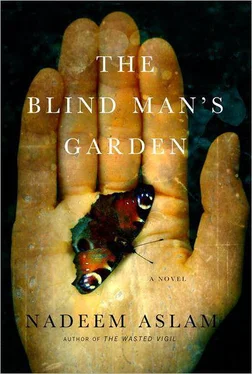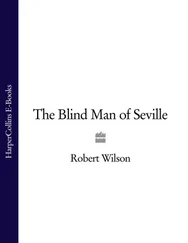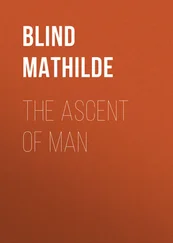He gets out and stands looking at the face taking a dim red glow from the taillights. He looks at the bed of the pickup. The chains look like the heaped entrails of a slaughtered metal beast. Some of the links are covered in rust, prayers that have gone unanswered for decades. He drops the tailgate and begins the process of lifting the man up onto the bed. At first he braces himself and tries to lift the soldier the obvious way, with one arm under his knees, the other under his armpits, careful of balance and with fine elastic adjustments of his body — but he is too heavy. Out of breath, his sides caving in and out, he props the man in a sitting position against the tailgate, the legs sticking out like a doll’s, and climbs up onto the bed and leans down and hooks his hands under the armpits. He doesn’t know what he’ll do if the man regains consciousness. Gathering all his strength into his arms he begins to pull the man up in swift and single-purposed hauls, unerring and untiring. Most of all he doesn’t wish to jostle the injuries too much, in case the pain brings the body out of sleep. He is sweating by the time he has transferred the man onto the bed. He lies stretched out beside him like a sibling, noisily sucking in the night air, the dead weight of the white man’s arm thrown over his stomach. Finally he rises, pulling free the looseness of his shirt caught under the American. The flashlight held in his teeth, a beam of radiance shooting from his mouth, he begins to separate the loops of the chains, identifying the neck, ankle and wrist rings. One bracelet is lying at the top of the heap of chains but he can’t find the other and has to send his arm deep into the tangled loops. He fastens the neck hoop around the man’s throat, removing the key once the lock clicks shut. He puts one of the wrist bands on the good wrist. The pickup’s bed is ten feet long and six wide, and above the bed is a six-foot-tall rectangular framework of pipes, for a tarpaulin cover to be draped and fitted over it. He passes several chains through the base of the pipe frame on either side of the American, so that he is secured to the pickup’s body. He will be able to manoeuvre himself into a sitting position but will not be able to stand up.
He climbs down.
He is sure he is being watched but he can see no one in the featureless night. He walks around to the front and takes out a bottle of water and returns and climbs back onto the bed. As he uncaps the bottle he rehearses out loud the question he will put to the man, preparing his voice for the venture. ‘Vere iz gurl? Vere iz gurl? Vere iz gurl?’
Moving closer to him he takes the man’s head in one arm, the dust-covered face turned up, and gently opens the mouth and eases the two rows of teeth apart, feeling his breath on his fingers, and begins to pour in a thin strand of water. The swallowing function is asleep and the mouth fills up to the brim and the water slides out from the corners. Then it catches the back of the throat, a column of bubbles rising through the water that fills the mouth, and the alarmed mind wakes the body. The man splutters and then opens his eyes, struggling powerfully as he tries to sit up. He blinks in the light of the torch in Mikal’s teeth. Mikal leaps away and the water drips from the bottle onto the bed of the pickup with a musical ringing. A loud half groan, half roar escapes the man as he feels the pain of his injury but even then he is so strong that his pulling at the chains can make the pickup rock slightly, twisting in confusion and then anger. It’s as though above his shouting mouth his eyes are shouting too, contributing to the sound. Mikal fears the soldering of the pipe frame will give, tearing it off the sides of the bed. And he hasn’t looked at Mikal beyond the initial eye contact. Mikal thought there was no need to secure the injured arm and the man tries more than once to lift it — failing and giving out an agonised bellow through gritted teeth each time.
Mikal stands at the tailgate, his torch shining into the man’s golden hair and the face glistening wet where water has washed away the dust. The eyes are green with splinters of brown in them.
‘Vere iz gurl?’ he says after a while.
The man has stopped struggling and sits gasping, the half ton of chains shifting around his muscles, but Mikal’s question remains unanswered.
Mikal looks at the sky. It’s almost nine o’clock and he is drenched in sweat. He knows some of these soldiers understand Urdu and Pashto, so he puts the question to him in both those languages, but to no avail. He climbs down and goes to the passenger seat and returns with the leopard cub. Standing at the tailgate he holds the cub out towards the man and says, ‘Vere hiz gurl?’
The American doesn’t look at him, examining the chains and the pipe frame intently. Mikal might as well not be here.
The stars move in the hot desert air and have a look of completeness to them, in comparison to the materials scattered about him here on earth, unassembled. When he sends the beam of the flashlight into the darkness the hills look like petrified clouds, ledges of hardened vapour.
The leopard calls out and he notices that its whistle has deepened from a songbird to an eagle. He sees the soldier lick water from his lips but when he moves forward with the bottle the man begins to struggle again, the eyes that needle and dare and challenge and threaten him.
Mikal gets back into the pickup, and with the heavy softness of the cub in his lap he begins to drive. ‘What have they been feeding you?’ he says, stroking the fur on the leopard’s head with one hand after they have been driving for five minutes, his breathing and heartbeat settling at last, the air from the window drying his clothes and skin. ‘Didn’t take you very long to become friendly with him, I see …’ He is still astonished at the power the animal’s eyes have over him, the gaze captivating within an instant, a radiant dreamlike effect on his mind. And then he begins to talk to it in a constant stream. ‘Are you going to say something to me? It’s probably beneath you to consort with someone like me these days. You’ve probably forgotten your own language by now, haven’t you? …’ As he drives he switches on the flashlight for a few moments to look through the glass window located behind his head. The soldier sits facing the other way and doesn’t react to the light that falls onto his shoulder. The chains won’t allow him to reach the glass of the window. ‘Don’t worry,’ Mikal tells the cub. ‘I am not going to hurt your new friend. I noticed there was a school next to Fatima’s sister’s house. One of the teachers will probably know English. That’s where I am taking him.’
Raising dust, the pickup moves through the night. A flock of ghostly storks crosses his vision at one point with light pulsing on their wings as on a river, their throats rippling with language that he hears over the engine, the voices whipping the black air. He is moving through wild terrain and during one long stretch between two endless hills it seems as if he is standing still. Every now and then he drives onto the road, the tar melted from the day’s heat, then drives back onto rough ground — travelling in a straight line as much as possible. Around ten thirty he sees a roadside mosque half a mile ahead, a single light bulb shining over its door. In all probability it will be deserted at this hour and he will drive past but still he wishes he had a tarpaulin to put over the framework. Just as he approaches the mosque he looks back and sees that the American is slumped over. He brakes and gets out and runs to the back. The eyes are closed. He climbs onto the bed and moves forwards, ready to feel the pulse, to push aside the chains and thrust his hand under the Kevlar armour and check for the heartbeat, but the man stirs and sits upright.
Читать дальше












